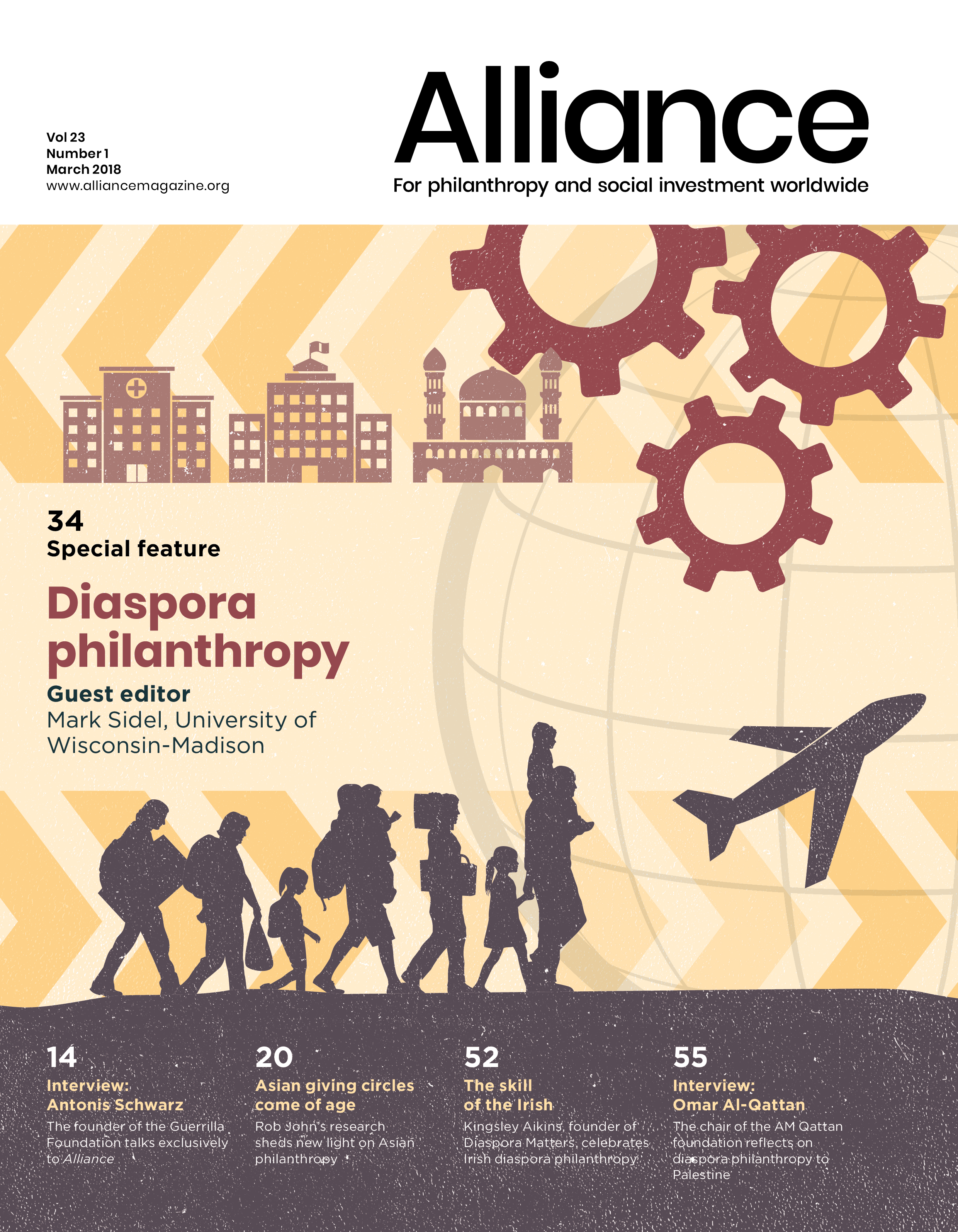Diaspora philanthropy in Pakistan can be categorized broadly into three streams of funding.
The first relates to faith-based contributions by overseas Pakistani charities and individuals, predominantly from the UK since the 1950s but increasingly from the Middle East.

New technology is providing a potentially rich seam of diaspora financing.
Photo credit: Dennis Skley.
The second is the giving by organizations and wealthy professionals in North America and the UK, largely organized by education and health service NGOs and trusts in Pakistan.
An emerging third is by entrepreneurs (venture capitalists and technology start-ups) in North America.
Faith-based giving
Faith-based charity is directly linked to obligatory zakat contributions made annually but also to the concept of sadqa and khairat.
Faith-based giving is channelled both through individual giving to established institutions such as the Edhi Foundation, Shaukat Khanum Memorial Cancer Hospital, and other well-known philanthropic-based institutions in Pakistan, but also through contributions collected systematically by charities and NGOs incorporated outside of Pakistan (Muslim Aid, Islamic Relief and Muslim Hands are three prominent ones with active programmes in Pakistan).
The latter utilizes its global fundraising systems to capture donations, and given its orientation is able to attract a large number of donors from the diaspora.
Such organizations are largely implementing humanitarian and relief programmes in disaster and conflict-affected areas, but they also support long-term development programmes in the water and sanitation, education and health sectors.
In more recent years, charities based in the Middle East such as Qatar Charity (working mostly with orphans and women) and others from Saudi Arabia have been running smaller, more narrowly focused programmes.
Some of these have come under scrutiny, as their sources of financing are allegedly linked to banned organizations.
Prominent Pakistani diaspora efforts from the Middle East include Pakistan Association Dubai and other individual giving mainly for hospitals, diagnostic and diabetes centres in Pakistan.
Education and health
Notable philanthropic efforts for education and health service delivery include both institutional giving organized in the US (such as the Association of Physicians of Pakistani Descent in North America), and philanthropy drives by large, Pakistan-based, NGOs such as The Citizens Foundation, Aman Foundation and Hashoo Foundation, which actively tap into the Pakistani diaspora in the UK and North America.
There are estimates that such efforts raise more than $1 billion annually to support schools, health centres and other service delivery programmes across Pakistan.
Many of their initiatives provide investment and recurring costs for social services through well-established programmes operated locally in Pakistan.
Notable philanthropic efforts for education and health service delivery include both institutional giving organized in the US and philanthropy drives by large, Pakistan-based, NGOs.
They have also prominently supported humanitarian efforts during devastating natural disasters such as the 2005 earthquake and the 2010 floods.
Giving from the technology sector
A new stream of diaspora financing, much less documented and not as large in terms of volume of giving, is based on the technology sector.
Code for America has partnered with Code for Pakistan to support start-ups and innovation in technology and there is more potential to tap into Pakistani entrepreneurs and venture capitalists in the Bay Area and elsewhere in the United States and globally.
One important, but lesser-known group is the Organization of Pakistani Entrepreneurs of North America which aims to connect Pakistani diaspora entrepreneurs with active chapters across the continent.
Some innovative start-ups in Pakistan are also setting up crowdfunding for development programmes to support education, women’s entrepreneurship and health services.
These are nascent and small, but offer tremendous potential to scale up and channel diaspora funding to targeted interventions.
Study needed
While diaspora funding in Pakistan is vast in terms of volume and impact, it is not well documented and often not disclosed. Studies and academic papers have been written in the past – most notably Adil Najam’s 2007 Portrait of a Giving Community: Philanthropy by the Pakistani-American Diaspora.
Building on its early work, the Pakistan Centre for Philanthropy (PCP) intends to embark on a comprehensive study and is making efforts to establish crowd financing tools to support systematic and institutionalized giving, including targeting the diaspora communities.
There is clearly a compelling argument to better analyze and document the trends for Pakistani diaspora funding, especially in order to provide more information to enable Pakistani organizations to tap into these funding sources.
Organizations such as the PCP, which maintain perhaps the most comprehensive database on NGOs and INGOs in Pakistan, would be well-placed to undertake a comprehensive diaspora study.
To cover the supply side dimensions, partnerships with relevant research or academic institutes outside Pakistan would be essential.
The issue of unregulated service delivery
One additional dimension of diaspora funding that needs to be considered is the unregulated nature of service delivery in Pakistan. Currently, over 50 per cent of basic education services (pre-primary through secondary) are provided by the private sector, much of it by low-cost providers and all of it unregulated in terms of quality and standards.
Healthcare, both primary and tertiary, is also delivered primarily by the private sector, often by public sector doctors running private practices. In this environment, private sector service delivery has flourished and it is to these fields that one finds diaspora funding being channelled.
There is clearly a compelling argument to better analyze and document the trends for Pakistani diaspora funding, especially in order to provide more information to enable Pakistani organizations to tap into these funding sources.
The flip side of this is that unregulated funding has been supporting an unchecked growth of madrassahs by banned organizations. In an environment where public sector governance of basic social services is weak, what role can diaspora philanthropy play in improving standards of services?
A comprehensive study would need to examine the demand side playing field, including the important role that civil society and the private sector play in Pakistan, in addition to analyzing the sources and scope of diaspora philanthropy.
Sofia Shakil is Pakistan country representative of The Asia Foundation.
Email sofia.shakil@asiafoundation.org






Comments (1)
Wonderful and informative article! Keep it up Sofia.